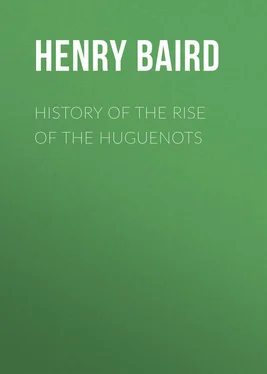Henry Baird - History of the Rise of the Huguenots
Здесь есть возможность читать онлайн «Henry Baird - History of the Rise of the Huguenots» — ознакомительный отрывок электронной книги совершенно бесплатно, а после прочтения отрывка купить полную версию. В некоторых случаях можно слушать аудио, скачать через торрент в формате fb2 и присутствует краткое содержание. ISBN: , Жанр: foreign_antique, foreign_prose, на английском языке. Описание произведения, (предисловие) а так же отзывы посетителей доступны на портале библиотеки ЛибКат.
- Название:History of the Rise of the Huguenots
- Автор:
- Жанр:
- Год:неизвестен
- ISBN:http://www.gutenberg.org/ebooks/30708
- Рейтинг книги:4 / 5. Голосов: 1
-
Избранное:Добавить в избранное
- Отзывы:
-
Ваша оценка:
- 80
- 1
- 2
- 3
- 4
- 5
History of the Rise of the Huguenots: краткое содержание, описание и аннотация
Предлагаем к чтению аннотацию, описание, краткое содержание или предисловие (зависит от того, что написал сам автор книги «History of the Rise of the Huguenots»). Если вы не нашли необходимую информацию о книге — напишите в комментариях, мы постараемся отыскать её.
History of the Rise of the Huguenots — читать онлайн ознакомительный отрывок
Ниже представлен текст книги, разбитый по страницам. Система сохранения места последней прочитанной страницы, позволяет с удобством читать онлайн бесплатно книгу «History of the Rise of the Huguenots», без необходимости каждый раз заново искать на чём Вы остановились. Поставьте закладку, и сможете в любой момент перейти на страницу, на которой закончили чтение.
Интервал:
Закладка:
174
Mém. de la Noue, c. viii.
175
When Lord Robert Dudley began to break to the queen the disheartening news that Rouen had fallen, Elizabeth betrayed "a marvellous remorse that she had not dealt more frankly for it," and instead of exhibiting displeasure at Poynings's presumption, seemed disposed to blame him that he had not sent a thousand men instead, for his fault would have been no greater. Dudley to Cecil, Oct. 30, 1562, Forbes, State Papers, ii. 155.
176
De Thou, iii. 328; Froude, vii. 436; Sir Thomas Smith to Throkmorton, Paris, Oct. 17, 1562, Forbes, State Papers, ii. 117.
177
"But thei will have there preaching still. Thei will have libertie of their religion, and thei will have no garrison wythin the towne, but will be masters therof themselves: and upon this point thei stand." Despatch of Sir Thomas Smith, Poissy, Oct. 20, 1562, Forbes, State Papers, ii. 123.
178
The plundering lasted eight days. While the Swiss obeyed orders, and promptly desisted, "the French suffered themselves to be killed rather than quit the place whilst there was anything left." Castelnau, liv. iii., c. 13. The curé of Mériot waxes jocose over the incidents of the capture: "Tout ce qui fut trouvé en armes par les rues et sur les murailles fut passé par le fil de l'espée. La ville fut mise au pillage par les soldatz du camp, qui se firent gentis compaignons. Dieu sçait que ceux qui estoient mal habillez pour leur yver (hiver) ne s'en allèrent sans robbe neufve. Les huguenotz de la ville furent en tout maltraictez," etc. Mém. de Claude Haton, i. 288.
179
On the siege of Rouen, see the graphic account of De Thou, iii. (liv. xxxiii.) 328-335; the copious correspondence of the English envoys in France, Forbes, State Papers, vol. ii.; the Hist. ecclés. des égl. réf., ii. 389-396 (and Marlorat's examination and sentence in extenso , 398-404); J. de Serres, ii. 259; La Noue, c. viii.; Davila (interesting, and not so inaccurate here as usual, perhaps because he had a brother-in-law, Jean de Hemery, sieur de Villers, in the Roman Catholic army, but who greatly exaggerates the Huguenot forces), ch. iii. 73-75; Castelnau, liv. iii., c. 13.
180
It is to be noted, however, that the order of the Prince of Condé, in the case of Sapin (November 2, 1562), makes no mention of the judicial murder of Marlorat, but alleges only his complicity with parliament in imprisoning the king, his mother, and the King of Navarre, in annulling royal edicts by magisterial orders, in constraining the king's officers to become idolaters, in declaring knights of the Order of St. Michael and other worthy gentlemen rebels, in ordering the tocsin to be rung, and inciting to assassination, etc. Hist. ecclés. des égl. réf., ii. 115, 116. See Bruslart, Mém. de Condé, i. 100. When Condé was informed that the Parisian parliament had gone in red robes to the "Sainte Chapelle," to hear a requiem mass for Counsellor Sapin, he laughed, and said that he hoped soon to multiply their litanies and kyrie eleysons . Hist. ecclés., ubi supra .
181
As early as October 27th, Navarre sent a gentleman to Jeanne d'Albret, then at Pau in Béarn, "desiring to have her now to cherish him, and do the part of a wife;" and the messenger told Sir Thomas Smith, with whom he dined that day in Evreux, "that the king pretendeth to him, that this punishment [his wounds] came to him well-deserved, for his unkindness in forsaking the truth." Forbes, State Papers, ii. 167. The authenticity of the story of Antoine of Navarre's death-bed repentance is sufficiently attested by the letter written, less than a year later (August, 1563), by his widow, Jeanne d'Albret, to the Cardinal of Armagnac: "Où sont ces belles couronnes que vous luy promettiés, et qu'il a acquises à combattre contre la vraye Religion et sa conscience; comme la confession dernière qu'il en a faite en sa mort en est seur tesmoignage, et les paroles dites à la Royne, en protestation de faire prescher les ministres par tout s'il guerissoit." Pierre Olhagaray, Histoire de Foix, Béarn, et Navarre (Paris, 1609), p. 546. See also Brantôme (edition Lalanne), iv. 367, and the account, written probably by Antoine's physician, De Taillevis, among the Dupuy MSS. of the Bibliothèque nationale, ibid., iv. 419.
182
Lestoile (Collection Michaud et Poujoulat), 15; Hist. ecclés. des égl. réf., ii. 397, 406-408; De Thou, 336, 337; Relation de la mort du roi de Navarre, Cimber et Danjou, iv. 67, etc.
183
I am convinced that the historian De Thou has drawn of this fickle prince much too charitable a portrait (iii. 337). It seems to be saying too much to affirm that "his merit equalled that of the greatest captains of his age;" and if "he loved justice, and was possessed of uprightness," it must be confessed that his dealings with neither party furnish much evidence of the fact. (I retain these remarks, although I find that the criticism has been anticipated by Soldan, ii. 78). Recalling the earlier relations of the men, it is not a little odd that, when the news of Navarre's death reached the "holy fathers" of the council then in session in the city of Trent, the papal legates and the presidents paid the Cardinal of Lorraine a formal visit to condole with him on the decease of his dear relative! (Acta Conc. Tridentini, apud Martene et Durand, Amplissima Collectio, tom. viii. 1299). The farce was, doubtless, well played, for the actors were of the best in Christendom.
184
Letter of Beza to Bullinger, Sept. 1, 1562, Baum, iii., App., 190. The Huguenots had sustained a heavy loss also in the utter defeat and dispersion by Blaise de Montluc of some five or six thousand troops of Gascony, which the Baron de Duras was bringing to Orleans.
185
The sentiments of well-informed Huguenots are reflected in a letter of Calvin, of September, 1562, urging the Protestants of Languedoc to make collections to defray the expense entailed by D'Andelot's levy. "D'entrer en question ou dispute pour reprendre les faultes passées, ce n'est pas le temps. Car, quoy qu'il en soit, Dieu nous a réduicts à telle extrémité que si vous n'estes secourus de ce costé-là, on ne voit apparence selon les hommes que d'une piteuse et horrible désolation." Bonnet, Lettres franç., ii. 475.
186
Hist. ecclés., ii. 421.
187
See "Capitulation des reytres et lansquenetz levez pour monseigneur le prince de Condé, du xviii. d'aoust 1562," Bulletin, xvi. (1867), 116-118. The reiters came chiefly from Hesse.
188
Claude Haton, no friend to Catharine, makes the Duke d'Aumale, in command of eight or nine thousand troops, avoid giving battle to D'Andelot, and content himself with watching his march from Lorraine as far as St. Florentin, in obedience to secret orders of the queen mother, signed with the king's seal. Mémoires, i. 294, 295. The fact was that D'Andelot adroitly eluded both the Duke of Nevers, Governor of Champagne, who was prepared to resist his passage, and Marshal Saint André, who had advanced to meet him with thirteen companies of "gens-d'armes" and some foot soldiers. Davila, bk. iii. 76; De Thou, iii. (liv. xxxiii.) 356.
189
Hist. ecclés. des égl. réf., ii. 114, 115. The writer ascribes the fall of Rouen to the delay of the reiters in assembling at their rendezvous. Instead of being ready on the first of October, it was not until the tenth that they had come in sufficient numbers to be mustered in.
Читать дальшеИнтервал:
Закладка:
Похожие книги на «History of the Rise of the Huguenots»
Представляем Вашему вниманию похожие книги на «History of the Rise of the Huguenots» списком для выбора. Мы отобрали схожую по названию и смыслу литературу в надежде предоставить читателям больше вариантов отыскать новые, интересные, ещё непрочитанные произведения.
Обсуждение, отзывы о книге «History of the Rise of the Huguenots» и просто собственные мнения читателей. Оставьте ваши комментарии, напишите, что Вы думаете о произведении, его смысле или главных героях. Укажите что конкретно понравилось, а что нет, и почему Вы так считаете.












